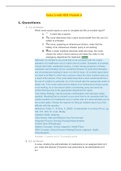Summary
Summary Constitutional Law
- Module
- Constitutional Law
- Institution
- Manchester Metropolitan University (MMU)
An in-depth summary of the Principles of Constitutional law. All knowledge gained from textbooks, lecture notes, and professionals covering this area of law. 5000+ word document
[Show more]












